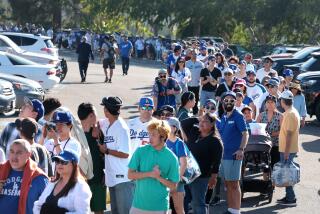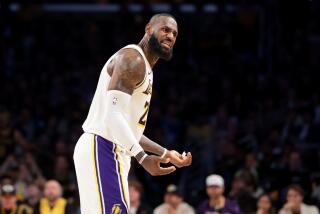Memo to NHL: Does Anybody Really Care?
- Share via
“I think we’re killing the game,” the player said.
“We are doing irrevocable damage to our sport by putting our fans through this process,” the team president said.
“We’re facing obscurity,” the agent said.
“Through the decades and generations we have faced a variety of crises and challenges, some of which seemed catastrophic at the time,” the commissioner said. “The league persevered through all these adversities, and the league will persevere through this one as well.”
Why is it that the one man with the most power sounds the least realistic about just how costly this unprecedented season shutdown will be?
But that has always been NHL Commissioner Gary Bettman’s approach. He never acknowledged the serious problems afflicting his sport, except when it came to how much money the teams were losing. The game itself was left to wither away.
Bettman never did anything with urgency, never appreciated how truly disposable the NHL could be. Here’s a little lesson: The citizens of Los Angeles have survived just fine without a local NFL team. We’re talking about the National Football League. Doesn’t Bettman think that every city south of the Canadian border could learn to live without a local NHL team?
Did he notice how little attention his lockout received in its first five months?
“In the United States, besides today, nobody’s talked about it,” King left wing Luc Robitaille said. “Nobody cares. That’s the biggest thing that I fear, is that nobody cares.”
We can’t go too far without firing a slap shot at Bob Goodenow, the players’ association director. Way to toss aside his hard-line refusal to accept a salary cap at the last minute. What was the point of hanging on this long? If Goodenow had been driving the convertible at the end of “Thelma and Louise”, the car would’ve pulled a U-turn just before the cliff.
“There were a lot of [players] disappointed with everything,” Robitaille said. “We said all along there would be no cap. Then when it happened, when our committee accepted a cap, there were a lot of players -- there were more players upset than saying, ‘OK, let’s play.’ That was the reaction.
“I think we’ve sacrificed so much, and I think it’s a matter of principle.”
Robitaille said what makes hockey players so special is their willingness to stick together.
Well, Goodenow just shaved his playoff beard before Game 7 of the Stanley Cup finals.
Back to Bettman. At one point Wednesday, as he announced that a new collective bargaining agreement with the union could not be reached in time to save what’s left of the 2004-05 season, he actually said, “I don’t have any concern that the fans will come back.”
Is he that arrogant, or that clueless?
He and the union have been so preoccupied with bickering about “cost certainty” and “linkage” that they didn’t realize how little their sport was missed.
What exactly were hockey fans denied in this non-season? The right to buy overpriced tickets to watch a mediocre game in a watered-down league.
There’s nothing wrong with the sport of hockey. This is about fixing the (cryogenically frozen) state of the NHL.
The best hockey we’ve seen in the last few years came at the 2002 Winter Olympics. Fourteen teams with the world’s best players skating on a wider rink, with two-line passing allowed and rough play discouraged.
Of course, we’ll never see anything like that in the NHL, which has ballooned to 30 franchises. And because the talent is so diluted, far too many teams are content to hook and grab their way through games to have a shot at winning. Don’t wait on widening the rink that would entail removing some of the priciest seats in the arena.
“The biggest mistake that was ever made was they built about 25 new buildings the past 10 years [and] they should have made those buildings a little wider, by 10 feet,” Robitaille said. “That would have made a big difference. You’re going to have to sell the game. I am a firm believer now, if you look back the last 10 years, they let the game die.”
When one astute questioner asked Bettman whether the biggest problem was that the game itself was broken, Bettman, in typical fashion, didn’t answer the question. He talked about economics.
He said the league grossed $2.1 billion in its last full season, and drew 20 million fans four years in a row, but the problem was the teams paid 75% of their revenue to the players.
This isn’t about the die-hard fans, those core groups of 16,000 fans in each NHL city that kept traipsing to the arenas and have remained faithful over the years, even as the ticket prices kept climbing. That’s not the problem. People don’t watch hockey on television, which means networks won’t pay huge rights fees -- not when ESPN can get better ratings by showing poker players (even fictional ones).
So instead of talking about linkage, Bettman should be talking shrinkage. Did we really have a pressing need for the Columbus Blue Jackets or Atlanta Thrashers? Not at all. The owners just wanted that quick hit of expansion cash, adding eight teams in a dozen years under Bettman.
Let those franchises that can’t make ends meet fold. The league would be better off for it. Instead, they’re about to let the entire body die when they could just remove an appendix.
How backward is Bettman? He could actually learn a lesson from Bud Selig, the clueless commissioner of baseball.
“Baseball changed their balls, they moved the fence, they did all that to sell the game [after the 1994 strike],” Robitaille said. “It took them a long time to come back. We’re not going to get Mark McGwire and Sammy Sosa coming in. Nobody’s going to come in and score 93 goals or get near Gretzky’s goal record, like they did in baseball. I think it’s going to be a lot of work when this thing comes back.”
Bettman could send his players to BALCO. Even a bad idea is better than no ideas.
More to Read
Go beyond the scoreboard
Get the latest on L.A.'s teams in the daily Sports Report newsletter.
You may occasionally receive promotional content from the Los Angeles Times.






